| Reviews & Columns |
|
Reviews DVD TV on DVD Blu-ray 4K UHD International DVDs In Theaters Reviews by Studio Video Games Features Collector Series DVDs Easter Egg Database Interviews DVD Talk Radio Feature Articles Columns Anime Talk DVD Savant Horror DVDs The M.O.D. Squad Art House HD Talk Silent DVD
|
DVD Talk Forum |
|
|
| Resources |
|
DVD Price Search Customer Service #'s RCE Info Links |
|
Columns
|
|
|
White Ribbon, The
Sony Pictures // Unrated // June 29, 2010
List Price: $38.90 [Buy now and save at Amazon]
The Film:
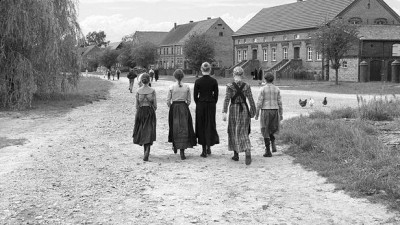 Micheal Haneke's Funny Games, though a Palme d'Or-nominated picture, still lingers in my mind as an intentionally provocative, faux-intellectual exercise in sadist tendencies. The tension is affective, without dispute, but the singularity of its harm-seeking manipulation -- not to mention an infuriating sequence involving a remote control -- more suggests a filmmaker with undeniable talent squandered on an exercise akin to a boy with a magnifying glass hovering above ants on a summer's day. It's these very impressions, built over a film from '97, that showcase exactly how he's ripened into the filmmaker who's shaped this latest piece of work, a Palme d'Or winner in The White Ribbon (Das weisse Band - Eine deutsche Kindergeschichte). A familiar sense of disquieting tension can be felt throughout Haneke's pre-WWI setting of communal suspense, one that echoes his previous pieces while permeated with thought-provoking intention and a terse, haunting visual style.
Micheal Haneke's Funny Games, though a Palme d'Or-nominated picture, still lingers in my mind as an intentionally provocative, faux-intellectual exercise in sadist tendencies. The tension is affective, without dispute, but the singularity of its harm-seeking manipulation -- not to mention an infuriating sequence involving a remote control -- more suggests a filmmaker with undeniable talent squandered on an exercise akin to a boy with a magnifying glass hovering above ants on a summer's day. It's these very impressions, built over a film from '97, that showcase exactly how he's ripened into the filmmaker who's shaped this latest piece of work, a Palme d'Or winner in The White Ribbon (Das weisse Band - Eine deutsche Kindergeschichte). A familiar sense of disquieting tension can be felt throughout Haneke's pre-WWI setting of communal suspense, one that echoes his previous pieces while permeated with thought-provoking intention and a terse, haunting visual style.
From a screenplay written by Haneke, which it wouldn't be surprising if he had John Wyndham's novel "The Midwich Cuckoos" -- later adapted into Village of the Damned -- in the back of his mind while doing so, this story recounts a schoolteacher's memories of a Protestant German farming township named Eichwald that saw an influx of cruel "accidents" occur during his tenure. The town's doctor (Rainer Bock, Inglourious Basterds), while on horseback, is tripped by a strategically-placed wire outside his home, sending him to a hospital some distance away. Shortly after, a wife to one of the farmers dies at a sawmill by stepping atop rotting wood that gave way underneath her feet. Other incidents, involving animal cruelty, violence to disabled children, and arson, heighten the tense suspicions in the township. It's once the pieces start to fall together, through the eyes of the then-thirty-something teacher (Christian Friedel), that it seems the children in the town's choir might be the culprits. Blame gets tossed around, even to the Baron and his family as overlords, yet no concrete evidence nor tangible answers can be found to prove anything.
The air of mystery within The White Ribbon, which settles between suggestive inclinations and the bustling anxiety within the townsfolk, builds into a domineering vibe that flirts with discreet horror and nihilistic undertones. Haneke has mastered tiptoeing along that line, knowing what to show us and what not to, which encourages our own analytical sleuthing. He scatters deliberate "clues" throughout -- early shots of the children walking together like a cult, with narration to back it up, along with escalations in their disobedience and aggression -- yet the actions we're actually shown could just be children shaping into distinct personalities as bullies and perverse deviants. This brainy vagueness heightens our curiosity in what could otherwise be seen as cut-and-dry spikes in adolescent hormones, leading into a question that's thicker with meaning than it sounds: "What's really going on here?"
But that's not a question Haneke will answer freely, not within this methodical structure where just about everything and everyone holds a purpose in his assertions. These vague yet unsettling symptoms of sin and hostility, whether it's the simple whims of wicked children or a hive-mind's concentrated effort towards antagonism, completely absorb us into his tense drama. The film's namesake comes from a white ribbon tied around two of the pastor's children's arms, a symbol that's supposed to suggest purity for the wearer, when, in fact, the pastor's hoping it'll forcefully purge whatever spite stirs in them. He, the villagers, and we as an audience never see them commit these plot-driving acts of viciousness, yet the embattled stillness in the children's eyes as they lurk around in large packs, acting like wild animals in classrooms and showing up at just the right moments around suspicious activities, suggest otherwise. Our common sense works in overtime to reassure us that there's not some paranormal force driving children to commit vile atrocities, because labeling the Baron's land as an uncontrollable, deeply-rooted evil instead of the people that populate it just isn't what Haneke's trying to get at. Though, knowing the director's repertoire, that suspicion never really escaped my thoughts.
It's the way the adults react to this simmering cruelty in The White Ribbon, bolstered by a slate of exquisite performances from both the adult and child actors, that transforms it into a fierce and complex outlook on authority's chokehold on fidelity. We're left in the dark about the parents' nature at first, especially the doctor injured at the beginning of the film, which drops the choir kids into villainous territory in our eyes. The initial accident falls into our mental backlog, as we witness pure interactions like the schoolteacher courting a modest, shy local villager and the town's pastor (Burghart Klaußner) instructing his young son on fathering an ailing bird, darting our thoughts between the mystery and the bits of purity stirring within this hornet's nest. It all seems very precise underneath Haneke's direction, very black and white; however, once we're given a glimpse into the doctor's vile, abrasive tendencies -- including a vitriolic sex-driven spat with the town's midwife (Haneke veteran Susanne Lothar, of Funny Games and The Castle), his lover, that is chillingly heartless and spiteful -- and the pastor's less-than-understanding staunchness, the film swiftly materializes into a graying play on morality that suggests a human evil propelled by sins of the father.
Maybe that's why Micheal Haneke projects The White Ribbon in stark, beautiful black-and-white photography, shot by Caché cinematographer Christian Berger, reminiscent of a frame-after-frame slideshow combining Ansel Adams' and German photographer August Sander's work. He empties the film of tangible color yet retains the gruff textures and varied shadows around the Baron's land, which, in effect, coarsens the film's demeanor as it seals away its warmth. You could argue that the photography teases the film's notion of its mystery being as visible as black is to white, sure, but it's hard to ignore the fact that the shots are simply more foreboding when void of color. The shadowy ways that mundane sequences are given suspenseful weight -- three boys wrestling over a flute, the flickering flames rising from a torched barn, and a young boy (Leonard Proxaufenduring) enduring his father's scathing comments about sexual morality, among many others -- help to shape the swelling pins-'n-needles atmosphere.
While crafted with a persistent mood and a vein of complex thought within its quasi-symbolic nature amid pre-war Germany, this is still a film constructed by one of contemporary cinema's more intimidating, and oftentimes pitiless, filmmakers, and Haneke's mark can be felt all the way until its unresolved yet aptly-toned conclusion. His exploitative nature relishes in the evil of the human spirit and how it both corrupts and harms those around it, which in this setting translates into the killing of an innocent animal, violent mistreatment of a mentally-challenged boy, death, suicide, and incest. The White Ribbon holds a self-aware propensity to engage thought and justify its hostility, though, while challenging its audience to perceive a festering, idealist evil underneath stringent control. And, though tough and rarely enjoyable in a conventional sense, it's spectacular in the way it does so.
The Blu-ray:
Video and Audio:
At times, writing about home media releases shares a lot in common with grading coins, books, or other collectibles for quality. It's easier to find things to say about items that have slight imperfections or distinguishing marks, while staggeringly clean, pristine examples demand less to be said about them -- other than, "perfect". Sony's Blu-ray of The White Ribbon, framed at 1.85:1 an encapsulated within a 1080p AVC encode, is a prime example, as the exquisite clarity of Christian Berger's cinematography ushers in one of the finest examples of black and white photography in high-definition you're likely to see. The fluid detail present in tree branches, bricks, clothing, wood textures, and all sorts of textural elements hold an exceptional clarity, zeroing in on the slightest of nuances to staggering degrees. Inky, deep black levels provide succulent displays of contrast projection, while every shade of gray in between scales up exceptionally to the film's glaring whites. Aside from one or two sequences with heavier grain and a few inconspicuous points where light speckles can be seen, this is a work of absolute beauty from Sony.
Audio arrives in a DTS HD Master Audio track that emphasizes earthy sound effects -- the sharp swipes of a scythe against vegetation, the creaking of a door, and the billowing of a barn fire -- against the copious narration, and it succeeds on all fronts. Slight usage of the lower-frequency channel adds punch to mundane sound effects, while also imbuing a range of personality to all the German voices present in the picture. It's never a bombastic affair, often as still and sterile as the visuals themselves, but the buoyancy of the track that's available here supports the track's needs wonderfully. Now, in regards to the different audio tracks, we've got two separate options -- a full German track, and a track with German dialogue and English narration. The English narration isn't the same as the German context, though the differences are slight, while the vocal talent carries a suitable, similar German accent to the original vocals. Subtitles are to Sony's normal high standards, though they reside a bit higher on the actual image than expected and, oftentimes, find their way into integral parts of the negative.
Special Features:
Making of The White Ribbon (38:40):
Starting out with faux-aged footage, this assembly piece quickly hops into interviews with director Haneke about the film. He discusses searching for locations accurate to his story's needs, the process of finding the children cast in the film throughout 7000 potential actors and actresses around the globe, shaping the young actors into their roles, and other topics. What makes this piece worth watching are the lengthy expanses of behind-the-scenes footage on-set and the casting footage of the young actors, showcasing how Haneke's strict directorial hand creates his pieces of work.
My Life (50:09):
This piece concentrates more on Micheal Haneke as an individual than his work on The White Ribbon, though behind-the-scenes footage and snippets from the film populate its length. Instead, interviews with people whom have worked with the director are intertwined with conversations with Haneke himself. Though the anecdotes that his actors -- including Caché's Juliette Binoche and some of the cast of The White Ribbon -- can be nice to watch, the extensiveness of the piece extends to overly congratulatory extents as it lumbers on.
Cannes Film Festival Premiere (18:36):
This piece is about what you'd expect from a Cannes-centered supplement, showcasing the cast and crew as they walk up the red carpet and discuss the film during the question/answer session. The parts that really highlight this piece is the chance to hear Christian Friedel, Leonie Benesch, and other members of the cast talk a bit about their experience working on the film -- for some, it being their first.
Interview with Micheal Haneke (14:07):
An intimate conversation with the director concludes the supplemental substance, though most of the material Haneke discusses can be seen in near-identical fashion in the Making Of piece on the disc. The only difference is that he finds a hard focus on the death conversation between the doctor's children over dinner, though his elaboration on the nature of children actors is similar to his discussion earlier on the disc.
Concluding the supplements, we've also a spoiler-heavy Theatrical Trailer (HD) and a slate of eight (8) Previews for other Sony arthouse pictures -- including trailers for A Prophet and The Secret in Their Eyes.
Final Thoughts:
Micheal Haneke's films generally have a forceful, vivid property about their brash content that limits the number of times one might be able to watch them. Though the Golden Globe-winning, Oscar-nominated picture The White Ribbon is no exception, with its cage-rattling string of violence, dramatic fervor, and explicit content, the way in which Haneke utilizes a town of volatile children as a figurative fascist touchstone makes for a compelling cinematic experience that yearns to be revisited and discussed. It also doesn't hurt that Christian Berger's cinematography transfixes our attention throughout the moody period piece, giving the eyes a wave of crisp images to dissect while our brains absorb Haneke's illustration of idealism's aftereffects. It's a tough film to swallow, but those reasons made a subsequent screening -- not but 24 hours after the first -- equally as enthralling the second time through.
Sony's Blu-ray presents the film with impeccable, aware audiovisual elements, along with a series of thorough, insightful but slightly indulgent features that mostly earn their weight with behind-the-scenes footage and a few off-the-cuff anecdotes about the director. Highly Recommended.
Thomas Spurlin, Staff Reviewer -- DVDTalk Reviews | Personal Blog/Site
 Micheal Haneke's Funny Games, though a Palme d'Or-nominated picture, still lingers in my mind as an intentionally provocative, faux-intellectual exercise in sadist tendencies. The tension is affective, without dispute, but the singularity of its harm-seeking manipulation -- not to mention an infuriating sequence involving a remote control -- more suggests a filmmaker with undeniable talent squandered on an exercise akin to a boy with a magnifying glass hovering above ants on a summer's day. It's these very impressions, built over a film from '97, that showcase exactly how he's ripened into the filmmaker who's shaped this latest piece of work, a Palme d'Or winner in The White Ribbon (Das weisse Band - Eine deutsche Kindergeschichte). A familiar sense of disquieting tension can be felt throughout Haneke's pre-WWI setting of communal suspense, one that echoes his previous pieces while permeated with thought-provoking intention and a terse, haunting visual style.
Micheal Haneke's Funny Games, though a Palme d'Or-nominated picture, still lingers in my mind as an intentionally provocative, faux-intellectual exercise in sadist tendencies. The tension is affective, without dispute, but the singularity of its harm-seeking manipulation -- not to mention an infuriating sequence involving a remote control -- more suggests a filmmaker with undeniable talent squandered on an exercise akin to a boy with a magnifying glass hovering above ants on a summer's day. It's these very impressions, built over a film from '97, that showcase exactly how he's ripened into the filmmaker who's shaped this latest piece of work, a Palme d'Or winner in The White Ribbon (Das weisse Band - Eine deutsche Kindergeschichte). A familiar sense of disquieting tension can be felt throughout Haneke's pre-WWI setting of communal suspense, one that echoes his previous pieces while permeated with thought-provoking intention and a terse, haunting visual style. From a screenplay written by Haneke, which it wouldn't be surprising if he had John Wyndham's novel "The Midwich Cuckoos" -- later adapted into Village of the Damned -- in the back of his mind while doing so, this story recounts a schoolteacher's memories of a Protestant German farming township named Eichwald that saw an influx of cruel "accidents" occur during his tenure. The town's doctor (Rainer Bock, Inglourious Basterds), while on horseback, is tripped by a strategically-placed wire outside his home, sending him to a hospital some distance away. Shortly after, a wife to one of the farmers dies at a sawmill by stepping atop rotting wood that gave way underneath her feet. Other incidents, involving animal cruelty, violence to disabled children, and arson, heighten the tense suspicions in the township. It's once the pieces start to fall together, through the eyes of the then-thirty-something teacher (Christian Friedel), that it seems the children in the town's choir might be the culprits. Blame gets tossed around, even to the Baron and his family as overlords, yet no concrete evidence nor tangible answers can be found to prove anything.
The air of mystery within The White Ribbon, which settles between suggestive inclinations and the bustling anxiety within the townsfolk, builds into a domineering vibe that flirts with discreet horror and nihilistic undertones. Haneke has mastered tiptoeing along that line, knowing what to show us and what not to, which encourages our own analytical sleuthing. He scatters deliberate "clues" throughout -- early shots of the children walking together like a cult, with narration to back it up, along with escalations in their disobedience and aggression -- yet the actions we're actually shown could just be children shaping into distinct personalities as bullies and perverse deviants. This brainy vagueness heightens our curiosity in what could otherwise be seen as cut-and-dry spikes in adolescent hormones, leading into a question that's thicker with meaning than it sounds: "What's really going on here?"
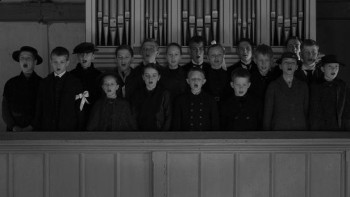 | 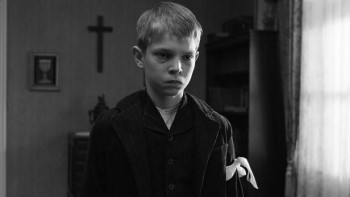 |
But that's not a question Haneke will answer freely, not within this methodical structure where just about everything and everyone holds a purpose in his assertions. These vague yet unsettling symptoms of sin and hostility, whether it's the simple whims of wicked children or a hive-mind's concentrated effort towards antagonism, completely absorb us into his tense drama. The film's namesake comes from a white ribbon tied around two of the pastor's children's arms, a symbol that's supposed to suggest purity for the wearer, when, in fact, the pastor's hoping it'll forcefully purge whatever spite stirs in them. He, the villagers, and we as an audience never see them commit these plot-driving acts of viciousness, yet the embattled stillness in the children's eyes as they lurk around in large packs, acting like wild animals in classrooms and showing up at just the right moments around suspicious activities, suggest otherwise. Our common sense works in overtime to reassure us that there's not some paranormal force driving children to commit vile atrocities, because labeling the Baron's land as an uncontrollable, deeply-rooted evil instead of the people that populate it just isn't what Haneke's trying to get at. Though, knowing the director's repertoire, that suspicion never really escaped my thoughts.
It's the way the adults react to this simmering cruelty in The White Ribbon, bolstered by a slate of exquisite performances from both the adult and child actors, that transforms it into a fierce and complex outlook on authority's chokehold on fidelity. We're left in the dark about the parents' nature at first, especially the doctor injured at the beginning of the film, which drops the choir kids into villainous territory in our eyes. The initial accident falls into our mental backlog, as we witness pure interactions like the schoolteacher courting a modest, shy local villager and the town's pastor (Burghart Klaußner) instructing his young son on fathering an ailing bird, darting our thoughts between the mystery and the bits of purity stirring within this hornet's nest. It all seems very precise underneath Haneke's direction, very black and white; however, once we're given a glimpse into the doctor's vile, abrasive tendencies -- including a vitriolic sex-driven spat with the town's midwife (Haneke veteran Susanne Lothar, of Funny Games and The Castle), his lover, that is chillingly heartless and spiteful -- and the pastor's less-than-understanding staunchness, the film swiftly materializes into a graying play on morality that suggests a human evil propelled by sins of the father.
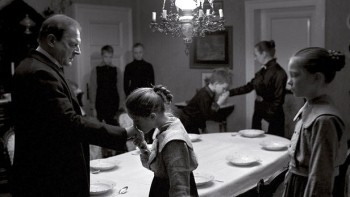 | 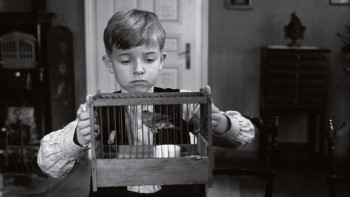 |
Maybe that's why Micheal Haneke projects The White Ribbon in stark, beautiful black-and-white photography, shot by Caché cinematographer Christian Berger, reminiscent of a frame-after-frame slideshow combining Ansel Adams' and German photographer August Sander's work. He empties the film of tangible color yet retains the gruff textures and varied shadows around the Baron's land, which, in effect, coarsens the film's demeanor as it seals away its warmth. You could argue that the photography teases the film's notion of its mystery being as visible as black is to white, sure, but it's hard to ignore the fact that the shots are simply more foreboding when void of color. The shadowy ways that mundane sequences are given suspenseful weight -- three boys wrestling over a flute, the flickering flames rising from a torched barn, and a young boy (Leonard Proxaufenduring) enduring his father's scathing comments about sexual morality, among many others -- help to shape the swelling pins-'n-needles atmosphere.
While crafted with a persistent mood and a vein of complex thought within its quasi-symbolic nature amid pre-war Germany, this is still a film constructed by one of contemporary cinema's more intimidating, and oftentimes pitiless, filmmakers, and Haneke's mark can be felt all the way until its unresolved yet aptly-toned conclusion. His exploitative nature relishes in the evil of the human spirit and how it both corrupts and harms those around it, which in this setting translates into the killing of an innocent animal, violent mistreatment of a mentally-challenged boy, death, suicide, and incest. The White Ribbon holds a self-aware propensity to engage thought and justify its hostility, though, while challenging its audience to perceive a festering, idealist evil underneath stringent control. And, though tough and rarely enjoyable in a conventional sense, it's spectacular in the way it does so.
The Blu-ray:
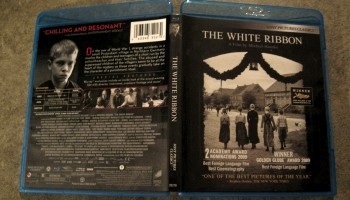 | 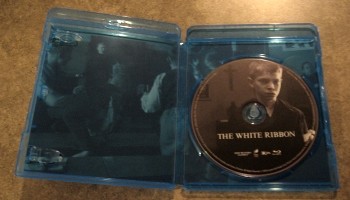 |
Video and Audio:
At times, writing about home media releases shares a lot in common with grading coins, books, or other collectibles for quality. It's easier to find things to say about items that have slight imperfections or distinguishing marks, while staggeringly clean, pristine examples demand less to be said about them -- other than, "perfect". Sony's Blu-ray of The White Ribbon, framed at 1.85:1 an encapsulated within a 1080p AVC encode, is a prime example, as the exquisite clarity of Christian Berger's cinematography ushers in one of the finest examples of black and white photography in high-definition you're likely to see. The fluid detail present in tree branches, bricks, clothing, wood textures, and all sorts of textural elements hold an exceptional clarity, zeroing in on the slightest of nuances to staggering degrees. Inky, deep black levels provide succulent displays of contrast projection, while every shade of gray in between scales up exceptionally to the film's glaring whites. Aside from one or two sequences with heavier grain and a few inconspicuous points where light speckles can be seen, this is a work of absolute beauty from Sony.
Audio arrives in a DTS HD Master Audio track that emphasizes earthy sound effects -- the sharp swipes of a scythe against vegetation, the creaking of a door, and the billowing of a barn fire -- against the copious narration, and it succeeds on all fronts. Slight usage of the lower-frequency channel adds punch to mundane sound effects, while also imbuing a range of personality to all the German voices present in the picture. It's never a bombastic affair, often as still and sterile as the visuals themselves, but the buoyancy of the track that's available here supports the track's needs wonderfully. Now, in regards to the different audio tracks, we've got two separate options -- a full German track, and a track with German dialogue and English narration. The English narration isn't the same as the German context, though the differences are slight, while the vocal talent carries a suitable, similar German accent to the original vocals. Subtitles are to Sony's normal high standards, though they reside a bit higher on the actual image than expected and, oftentimes, find their way into integral parts of the negative.
Special Features:
Making of The White Ribbon (38:40):
Starting out with faux-aged footage, this assembly piece quickly hops into interviews with director Haneke about the film. He discusses searching for locations accurate to his story's needs, the process of finding the children cast in the film throughout 7000 potential actors and actresses around the globe, shaping the young actors into their roles, and other topics. What makes this piece worth watching are the lengthy expanses of behind-the-scenes footage on-set and the casting footage of the young actors, showcasing how Haneke's strict directorial hand creates his pieces of work.
My Life (50:09):
This piece concentrates more on Micheal Haneke as an individual than his work on The White Ribbon, though behind-the-scenes footage and snippets from the film populate its length. Instead, interviews with people whom have worked with the director are intertwined with conversations with Haneke himself. Though the anecdotes that his actors -- including Caché's Juliette Binoche and some of the cast of The White Ribbon -- can be nice to watch, the extensiveness of the piece extends to overly congratulatory extents as it lumbers on.
Cannes Film Festival Premiere (18:36):
This piece is about what you'd expect from a Cannes-centered supplement, showcasing the cast and crew as they walk up the red carpet and discuss the film during the question/answer session. The parts that really highlight this piece is the chance to hear Christian Friedel, Leonie Benesch, and other members of the cast talk a bit about their experience working on the film -- for some, it being their first.
Interview with Micheal Haneke (14:07):
An intimate conversation with the director concludes the supplemental substance, though most of the material Haneke discusses can be seen in near-identical fashion in the Making Of piece on the disc. The only difference is that he finds a hard focus on the death conversation between the doctor's children over dinner, though his elaboration on the nature of children actors is similar to his discussion earlier on the disc.
Concluding the supplements, we've also a spoiler-heavy Theatrical Trailer (HD) and a slate of eight (8) Previews for other Sony arthouse pictures -- including trailers for A Prophet and The Secret in Their Eyes.
Final Thoughts:
Micheal Haneke's films generally have a forceful, vivid property about their brash content that limits the number of times one might be able to watch them. Though the Golden Globe-winning, Oscar-nominated picture The White Ribbon is no exception, with its cage-rattling string of violence, dramatic fervor, and explicit content, the way in which Haneke utilizes a town of volatile children as a figurative fascist touchstone makes for a compelling cinematic experience that yearns to be revisited and discussed. It also doesn't hurt that Christian Berger's cinematography transfixes our attention throughout the moody period piece, giving the eyes a wave of crisp images to dissect while our brains absorb Haneke's illustration of idealism's aftereffects. It's a tough film to swallow, but those reasons made a subsequent screening -- not but 24 hours after the first -- equally as enthralling the second time through.
Sony's Blu-ray presents the film with impeccable, aware audiovisual elements, along with a series of thorough, insightful but slightly indulgent features that mostly earn their weight with behind-the-scenes footage and a few off-the-cuff anecdotes about the director. Highly Recommended.
|
| Popular Reviews |
| Sponsored Links |
|
|
| Sponsored Links |
|
|
| Release List | Reviews | Shop | Newsletter | Forum | DVD Giveaways | Blu-Ray | Advertise |
|
Copyright 2024 DVDTalk.com All Rights Reserved. Legal Info, Privacy Policy, Terms of Use,
Manage Preferences,
Your Privacy Choices | |||||||














